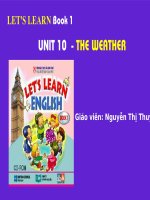unit 5 the media tiếng anh 9 sách cũ nguyễn tiến lực thư viện giáo án điện tử
Bạn đang xem bản rút gọn của tài liệu. Xem và tải ngay bản đầy đủ của tài liệu tại đây (168.33 KB, 10 trang )
<span class='text_page_counter'>(1)</span><div class='page_container' data-page=1>
<i> - Week: 14, 15, 16</i>
<i> - Form: 9A 2,8</i>
<i> - Period: 28, 29, 30, 31, 32 - Date of teaching: /11/ 2018 -> /12 /2018</i>
<b>UNIT 5: THE MEDIA</b>
<b>Period 28: Getting started – Listen </b>
<b> read</b>
<b>I. OBJECTIVES: </b>
- Sts. know more about media.
- Developing sts’ listening and reading skill.
- Sts. know how to spend time using media appropriately.
<b>II. LANGUAGE CONTENT:</b>
<b>1. Vocabulary: </b>wordsrelating to media
<b>2. Grammar: </b>Passive voice (review); Gerund after like/ love/ enjoy ...
<b>III. METHOD AND TEACHING AIDS: </b>
<b>1. Method: </b>Audio-lingual method; communicative approach
<b>2. Teaching aids:</b> CD and cassette, textbooks, pictures, cardboard …
<b>IV. TEACHING PROCEDURES:</b>
<b>1-Warm up:</b> (network)
- Ask sts to look at the pictures (textbook/p40) and tell the names of activities people in the
pictures are doing.
- Ask sts to think about their favorite activities and how much time they spend on each activity.
<i><b> Using the internet</b></i> <i>Reading newspapers</i>
<i><b> Chatting </b></i><b> favorite activities </b><i>Playing computer games</i>
<i><b> </b></i>
<i><b> </b></i>
Watching TV Listening to music
- Ask sts to practice asking and answering:
<i>A: Which of these is your favorite activity in your free time?</i>
<i>B:...</i>
<i>A: How many hours a week do you spend watching TV ?</i>
<i>B:...</i>
<b>2-Pre-reading</b>
- Ask sts to listen to the CD and tell the names of kinds of the media that are mentioned.
(closed books)
- Provide and explain new words:
<i>- medium (n) -> media (pl.n) </i>
<i>- town crier (n)</i>
<i>- to ring a bell</i>
<i>- shout (n,v) </i>
<i>- expensive (a) ≠ inexpensive (a)</i>
<i>- view (n) -> viewer (n)</i>
<i>- variety (n) -> a variety of ≈ a lot</i>
<i>of </i>
<i>- channel (n)</i>
<i>- adult (n)</i>
<i>- stage (n)</i>
<i>- interact (v) -> interactive (a) ->interaction (n)</i>
<i>- remote (a)</i>
<i>- control (n,v)</i>
<i>-> remote control (n)</i>
<i>- benefit (n)</i>
<i>- Internet (n) -> to use the Internet</i>
<i><b>* to love/ like + V-ing</b></i>
</div>
<span class='text_page_counter'>(2)</span><div class='page_container' data-page=2>
- Ask sts to listen to the CD again (opened book)
<i><b>* Giving prediction </b></i>
- Ask sts to match the pictures (4 pictures in textbook) to the 4 statements in the cardboard.
<i>a. Television is a cheap and convenient entertainment.</i>
<i>b. Vietnamese enjoy reading “Kien thuc ngay nay”, one of the most popular magazine.</i>
<i>c. Long time ago, crier had to shout the latest news as they were walking in the street.</i>
<i>d. Interactive TV is the development of TV.</i>
<b>3-While reading</b>
<b>* Read and check</b>
- Ask Sts. to read the text about the media in silence and check their prediction.
- Give feedback and correct
<i><b>Answers: picture 1-c; picture 2-b; picture 3-a; picture 4-d</b></i>
<b>*Complete the table </b>(exercise a/ p41)
- Ask Sts. to work individually, then share their answers with their partners
<i><b>Answers: 2-B, 3-B, 4-C, 5-A, 6-D</b></i>
<b>* Comprehension questions</b>
- Have sts work in pairs to answer the questions (exercise b/ p42)
- Call on some pairs to ask and answer the questions in front of class
- Give feedback and correct
<i><b>Answer</b></i>
<i>1. Person whose job was to go to through city streets ringing a bell and shouting the latest</i>
<i>news as he was walking.</i>
<i>2. KTNN is one of the most popular magazines and is widely read by both teenagers and</i>
<i>adults.</i>
<i>3. People can get the latest information, enjoy interesting local and international programs in</i>
<i>an inexpensive and convenient way. </i>
<i>4, 5 (sts’s answer)</i>
<b>4- Post reading (speaking)</b>
- Ask sts to work in pairs to practice asking and answering about their favorite type of the
media and the reason “why”.
<b>5-Homework: </b>
- Ask Sts. to learn new words by heart and prepare "SPEAK, LISTEN"
<b>V. TEACHING EXPERIENCE: </b>
___________________________
<b>PERIOD 29: SPEAK + LISTEN</b>
<b>I. OBJECTIVES: </b>
- Sts know when some kinds of media appeared.
<b>-</b> Developing sts’ speaking and listening skills:
</div>
<span class='text_page_counter'>(3)</span><div class='page_container' data-page=3>
+ Listening for the information.
- Sts know to choose suitable TV programs for themselves.
<b>II. LANGUAGE CONTENT:</b>
<b>1. Vocabulary: </b>words relating to TV programs
<b>2. Grammar: </b>Tag question, Gerund after like/ love/ enjoy ...
<b>III. METHOD AND TEACHING AIDS: </b>
<b>1. Method: </b>Audio-lingual method, communicative approach
<b>2. Teaching aids:</b>tapes and cassette, textbooks, cardboard …
<b>IV. TEACHING PROCEDURES:</b>
<b>1-Warm up:</b><i><b> (information transmitting Game)</b></i>
- Choose 2 teams of 6
- The teams stand in 2 lines
- Show the first st in each line a sentence (written on a small piece of paper)
- He / She whispers the sentence to the next person in his line.
- The second st whispers to the third… and so on.
- The last st shouts out the sentence, if it is the same as the sentence the teacher shows, that
team wins the game.
<i><b>* Suggested sentences</b></i>
<i>You don’t like foreign film, do you?</i>
<i>2</i><b>- Pre – speaking </b>
<i><b>* New words</b></i>
<i>- violent (a)</i> <i>- drama (n)</i>
<i>- documentary (n)</i> <i>- forecast (n, v) ≈</i> predict (v)
<i>- informative (a)</i> <i>-> Weather Forecast </i>
<i><b>* Grammar:</b></i>
<i>* seem + adj</i>
<i><b>* like / love/ enjoy/ prefer/ hate/ dislike ... + Noun/ V-ing</b></i>
<i><b>Note: like / prefer + to V</b></i>
<i><b>* Revision of tag questions</b></i>
- Ask sts to complete the sentences:
<i>+ You like watching sport, don’t you?</i>
<i>+ You don’t like foreign film, do you?</i>
- Remind sts of the verb form and the intonation of tag questions
<b>Statement</b> <b>Tag Question</b>
V: affirmative V: negative
V: negative V: affirmative
- Ask sts to read the table (p42) in silence to have some information about the TV programs.
<b>3- While speaking:</b>
<i><b>a. Read the dia.</b></i> (pair-work)
- Let sts practice the dialogue in pairs.
- Have some pairs of sts read the dialogue aloud in front of class.
- Check their pronunciation / intonation of tag questions.
- Have sts pick out sentences showing agreement and disagreement
<i><b>* Agreement</b></i>
</div>
<span class='text_page_counter'>(4)</span><div class='page_container' data-page=4>
<i>I love watching sports.</i>
<i>I enjoy it, too.</i>
<i><b>* Disagreement</b></i>
<i>Not really.</i>
<i>I don’t like watching sports.</i>
<i>I’m the opposite.</i>
<i>Documentaries seem quite boring to me.</i>
<i><b>b. Make a similar dia.</b></i>
- Ask sts to work in pairs talking to each other about the TV programs they like or dislike
(making the similar dialogue).
- T goes round to help sts if necessary.
<b>4- Post speaking</b>
- Call on some pairs to perform their dialogue in front of class.
<b>B/ LISTENING</b>
<b>1. Warm up: </b><i><b>(guessing game)</b></i>
- Get sts to think about the activities they often do in their free time.
<i><b>* Possible answers:</b></i>
<i>+ playing video games/ chatting with friends/ going shopping/ using the Internet ...</i>
- Ask sts. to write his/her favorite activity in a small piece of paper and keep it secret.
- Get other sts. to ask Yes/No questions to guess their friend’s favorite activity.
Ex: <i>Do you like watching TV? - No</i>
<i>Do you like chatting with your friends?- Yes. You're right.</i>
<b>2. Pre-listening</b>
- Set the scene: <i>“Chau is doing the assignment about the media, she asks her father some</i>
<i>information to complete the assignment”</i>
- Explain some new words:
<i>+ printed newspaper</i> <i>+ newsreels (n)</i>
<i>+ telegraph (n)</i> <i>+ journalism (n)</i>
<i><b>* Pair work:</b></i>
- Have sts guess the information to fill in the table on page 43.
<b>3. While listening</b>
- Ask sts to listen to the tape twice and check their prediction
- Ask sts. to compare their answers with their partner's.
<b>4. Post listening</b>
- Collect sts' answers -> give feedback and correct.
<b>* Answer: </b>
<i>a. the late 19th<sub> century</sub></i>
<i>b. radio and newsreels</i>
<i>c. in the 1950s</i>
<i>d . the Internet</i>
- Ask sts. to write down the full answers on their notebooks.
<b>5. Homework</b>
- Sts. write down the dialogue they have made on their notebooks & prepare “READ”
</div>
<span class='text_page_counter'>(5)</span><div class='page_container' data-page=5>
<b></b>
<b>---UNIT 5: THE MEDIA</b>
<i><b>Period 30: Read</b></i>
<b>I. OBJECTIVES: </b>
- After studying the lesson, sts have more knowledge about the Internet (advantages and
disadvantages).
- Developing sts’ reading skill.
- Sts. know to use the Internet usefully.
<b>II. LANGUAGE CONTENT:</b>
<b>1. Vocabulary: </b>words relating to the Internet
<b>2. Grammar: </b>Gerund (review)
<b>III. METHOD AND TEACHING AIDS: </b>
<b>1. Method: </b>PPP
<b>2. Teaching aids: </b>textbook, pictures…
<b>IV. TEACHING PROCEDURES:</b>
<b>1-Warm up: </b>(chatting)
- Show a picture of a computer and ask sts. about it:
<i>1. What’s this?</i>
<i>2. Can you use a computer?</i>
<i>3. What subjects help you to use computers?</i>
<i>4. Have you ever used the Internet?</i>
<i>5. Do you find the Internet useful?</i>
<i>6. What do you use the Internet for?</i>
<b>2-Pre-reading</b>
<b>True – False statement prediction</b>
- Ask sts to read the statements (on cardboard) and work in pairs to predict they are true or
false.
<b>Statements</b> <b>True</b> <b>False</b>
<i>a. Internet is a wonderful invention of modern life.</i>
<i>b. The internet is available not only in cities but also in the countryside.</i>
<i>c. People use the internet for 2 purposes: education and entertainment.</i>
<i>d. Bad program is one of the limitations of the Internet.</i>
<i>e. You should be alert when using the internet.</i>
- Give feedback
* <b>Set the scene : </b> “<i>There is a forum on the Internet. You will read some opinions about the</i>
<i>advantages and disadvantages of the Internet.”</i>
<i><b>* New words:</b></i>
<i>- forum (n) : </i>
<i>- increase (v) ≠ decrease (v)</i>
<i>- surf (n,v): </i>
<i>-> to surf the web </i>
<i>- respond (v) </i>
<i>- communicate (v) -> communication (n)</i>
<i> -> communicative (a)</i>
<i>- deny (v) </i>
<i>- benefit (n)</i>
<i>- entertain (v) entertainment (n)</i>
<i>- commerce (n)</i>
<i>- limit (n, v) -> limitation (n)</i>
<i>- consume (v) -> consumption (n)</i>
<i>- time – consuming (a) </i>
<i>- cost ( n, v) -> costly (a)</i>
<i>- virus (n) </i>
</div>
<span class='text_page_counter'>(6)</span><div class='page_container' data-page=6>
<i>- available (a) ≠ unavailable (a)</i>
<i>- access (n) -> to get access ( to )… </i>
<i>- explore (v) -> explorer -> exploration (n)</i>
<i>- wander (v) </i>
<i>- electronic junk mail </i>
<i>- leak (v)</i>
<i>- to be alert </i>
<i> - purpose (n)</i>
<b>3- While-reading</b>
<b>Read and check prediction</b>
- Have sts read the text on p43,44 and check their prediction
- Ask sts to correct if the statement is false
- Give feedback and correct
<i><b>* Answer</b></i>
<i>a, b, d, e : true</i>
<i>* b/ </i> Teacher gives more explanation: “<i>Many years ago it was not easy to get access to</i>
<i>the Internet in the countryside, but wherever we are we can get access to the Internet easily</i>
<i>nowadays.” </i>
<i> c: false ->People use the internet for many purposes: education, information,</i>
<i>communication, commerce and entertainment …</i>
<b>* Comprehension questions</b>
- Have sts read the text again and answer the questions on p44
- Get sts to work in pairs, practicing asking and answering
- Call on some sts to call out their answers -> Give feedback and correct.
<i><b>* Answer</b></i>
<i>1. She uses the Internet to get information and to communicate with her friends and</i>
<i>relatives.</i>
<i>2. Because she lives in the countryside where the internet is unavailable. </i>
<b>(-> This is not suitable nowadays.)</b>
<i>3. People use the internet for: education, information, communication, commerce and</i>
<i>entertainment</i>
<i>4. Benefits: The internet is used for multi- purposes such as :</i>
<i>* for getting information (in fast and convenient way)</i>
<i>* education</i>
<i>* communication</i>
<i>* commerce </i>
<i>* entertainment</i>
<i>5. Yes, there are some disadvantages:</i>
<i>* time-consuming</i>
<i>* costly</i>
<i>* dangerous because of viruses and bad programs</i>
<i>* spam / electronic junk mail</i>
<i>* personal information leaking</i>
<b>4- Post reading</b>
- Ask sts. to discuss in groups.
<i>“Do you agree or disagree with the responses? What is your response to this forum?”</i>
<i>-> Representatives of groups present their responses in front of class.</i>
- Give feedback
<b>5- Homework </b>
- Have sts write down their responses on their notebooks.
</div>
<span class='text_page_counter'>(7)</span><div class='page_container' data-page=7>
<b>V. TEACHING EXPERIENCE</b>
<b>UNIT 5: THE MEDIA</b>
<i><b>Period 31: Write</b></i>
<b>I. OBJECTIVES: </b>
- Sts. know more about the benefits of the Internet.
- Developing sts’ writing skill. Sts will be able to write a passage about the benefits of the
Internet.
- Sts know to use the Internet for useful purposes.
<b>II. LANGUAGE CONTENT:</b>
<b>1. Vocabulary: </b>words relating to the Internet and its benefits.
<b>2. Grammar: </b>S. present
<b>III. METHOD AND TEACHING AIDS: </b>
<b>1. Method: </b>Audio-lingual method, communicative approach
<b>2. Teaching aids: </b>textbook, cardboard…
<b>IV. TEACHING PROCEDURES:</b>
<b>1-Warm up</b>
- Ask sts to tell advantages and disadvantages of the Internet.
<b>Advantages INTERNET Disadvantages</b>
<i>* for getting information </i> <i>* time-consuming</i>
<i>* education</i> <i>* costly</i>
<i>* communication</i> <i>* viruses and bad programs</i>
<i>* commerce </i> <i>* spam / electronic junk mail</i>
<i>* entertainment</i> <i>* personal information leaking</i>
<b>2. Pre-writing</b>
<b>* Reading and Discussing</b>
- Have sts read the text on p43,44 again, then add to the list some more the benefits of the
internet.
- Have sts discuss the benefits of the internet, using the cues on p44
- Give sts some more ideas:
<i>+ easy to get information</i>
<i>+ communicate with friends, relatives … (email, chatting, web cam )</i>
<i>+ book tickets, goods, trips, hotels …</i>
- Explain how to present a passage of argument:
<i>* A passage: + Topic sentence </i>
<i>+ Support 1: Firstly, ...</i>
<i>+ Support 2: Secondly, ...</i>
<i>+ Support 3: Thirdly, ...</i>
<i>+ ...</i>
<i>+ Conclusion </i>
<b>3. While-writing </b>(group-work)
- Have sts use the ideas they’ve discussed to write a passage about the benefits of the Internet.
</div>
<span class='text_page_counter'>(8)</span><div class='page_container' data-page=8>
- Call on 3 sts to write their passages on the board.
- Help them to correct these passages
<i><b>* Suggested writing: </b></i>
<i>The Internet was one of the greatest inventions in the 21st century. It has brought a lot</i>
<i>of benefits to people's life.</i>
<i>Firstly, the Internet is used as a source of information. People can get the latest local</i>
<i>or global news or check weather conditions before they go outdoors.</i>
<i>Secondly, the Internet is also a source of entertainment. People can listen to music, see</i>
<i>movies or even play games. It makes them relax after a hard working day.</i>
<i>Thirdly, the Internet is also a means of education. People can learn English, look up a</i>
<i>dictionary and take part in online classes to improve their knowledge.</i>
<i>In conclusion, the Internet has become part of people's life. Its benefits have made</i>
<i>people's life more comfortable and convenient. </i>
<b>5- Homework </b>
- T. asks sts. to write a short passage about the disadvantages of the Internet.
<b>V. TEACHING EXPERIENCE:</b>
__________________________________________
<b>UNIT 5: THE MEDIA </b>
<i><b>Period 32: Language focus</b></i>
<b>I. OBJECTIVES: </b>
- Sts. know more about the media.
- Sts. have a chance to practice grammar points in Unit 5.
- Developing sts’ speaking skill. They talk to one another about the media and the things
they like or dislike.
<b>II. LANGUAGE CONTENT:</b>
<b>1. Vocabulary:</b> Words relating to the media and TV programs
<b>2. Grammar: </b>Tag question, Gerund after some verbs
<b>III. METHOD AND TEACHING AIDS: </b>
<b>1. Method: </b> Teaching grammar
<b>2. Teaching aids:</b> cardboard, textbooks, …
<b>IV. TEACHING PROCEDURES:</b>
<b>* TAG QUESTIONS</b>
<b>1/ Presentation: </b>
<i><b>Revision of tag questions</b></i>
- Ask sts to complete the sentences
<i>a. They enjoyed listening to music, --- ?</i>
<i>b. she can’t speak English, --- ?</i>
<i>c. She doesn’t like film, --- ?</i>
<i>d. You aren’t French, ---?</i>
- Give feedback and correct
<i><b>Answer</b></i>
</div>
<span class='text_page_counter'>(9)</span><div class='page_container' data-page=9>
<i>b. can she </i>
<i>c. does she </i>
<i>d. are you</i>
- Elicit from sts the verb form of tag questions and intonation
<i><b>Verb form of tag questions</b></i>
<b>Statement</b> <b>Tag Question</b>
<i>V: affirmative</i> <i>V: negative</i>
<i>V: negative</i>
(no, never, hardly, scarcely, seldom, few,
little…)
<i>V: affirmative</i>
<i>be/ modal verbs</i> <i>be/ modal verbs</i>
<i>request, command</i> <i>will/ won’t you?</i>
<i>Let’s…</i> <i>shall we ?</i>
- Give some more examples:
<b>Ex</b>: <i>I am late, aren’t I ?</i>
<i> There is an interesting film on TV, isn’t there? </i>
<i>* Intonation:</i>
<i>+ If we are asking a real question, we use a rising intonation.</i>
<i>+ If we are sure about the answer, we use a falling intonation.</i>
<b>2/ Practice: </b>
* Task 1:
- Ask Sts to complete the dial with tag questions, then practice in pairs.
- Give feedback and correct
<i><b>Answer</b></i>
<i>b. didn’t he</i>
<i>c. wasn’t it</i>
<i>d. do you</i>
<i>e. aren’t we</i>
* Task 2:
- Have sts look at the table and the 2 examples on page 45/ textbook.
- Ask sts. to use tag questions to ask and answer about television programs, these people like
and dislike.
<b>* GERUND: (V-ing)</b>
<b>1. Presentation: </b>
- Gerund is used after some verbs: <b>like/ love/ enjoy/ dislike/ hate … + V-ing</b>
<b>2. Practice:</b>
* Task 1: Exercise 3 on p46
- Ask sts. to practice the examples.
- Have sts. work in pairs to ask and answer questions about each item in the box.
- Give feedback and correct.
* Task 2:
- Ask sts to look at the words in three boxes on p46 and use them as cues to write true
sentences about their family members, relatives, friends and themselves.
</div>
<span class='text_page_counter'>(10)</span><div class='page_container' data-page=10>
- Give feedback and correct
<b>3- Homework</b>
Have sts write some sentences about their friends using <b>like/ love/ enjoy + V-ing</b>
<b>V. TEACHING EXPERIENCE:</b>
__________________________________
Ký duyệt TTCM
</div>
<!--links-->









